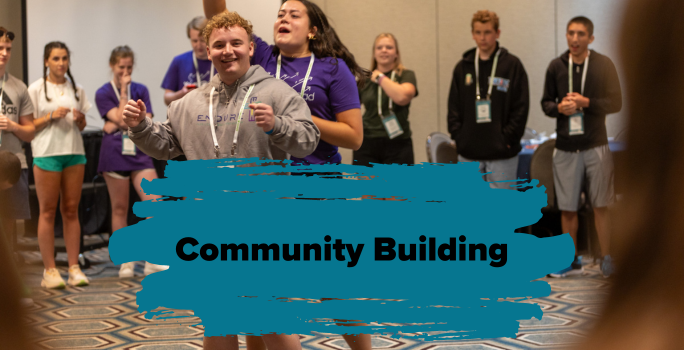The primary focus of Servant Events is, obviously, service and spiritual development. However, good community building assists in both of those goals. When strong relational ties are built, participants serve more effectively, be more willing to engage in Bible study and prayer and encourage one another along the way. Whether your group is under 10 people or over 100, it is important to help participants build a supportive and Christ-centered community during your event.
Most Servant Events bring together groups from different locations and congregations. These groups might be tightly knit, or new to one another. Some new relationships will develop easily, but our natural inclination is to stay close to the few people we know the best. With so many relational dynamics, it is best to plan how you will develop community across your event. The leadership team can set a strategy to make sure that all participants meet new people, build relational connections and perhaps even develop lifelong friendships.
Programmatic Ways of Building Community
One of the best ways to help youth connect with peers and adult leaders is to plan for different kinds of small groups in your programming. Consider the groups that will happen as a part of your programming, like:
- Bible study groups
- Service site groups
- Housing or cabin groups
After registration is completed, these groups can be preset to give participants three or more groups they will interact with regularly throughout their week. As you plan these groups, consider things like skills for service, age and comfort levels for teens. For example, if you are sleeping in a church, school or cabin, you may want to make sure youth participants have at least a few people they know and are comfortable with in their sleeping room. Or your mixture of participants on service sites might be less diverse because of the high skill level needed for the service.
Planning to mix groups in these ways gives participants opportunities to engage with others with a shared purpose. It may seem uncomfortable for some, so be prepared to foster these relationships from the beginning of the event. This might mean doing some of your opening ice breakers in these groups, so they learn names and a bit about each person.
While we highly encourage mixing groups for at least some of these program areas, please be sure to include time when church groups can connect as well. We want to foster relationship building, but youth and adults also need to connect within their church group. These relationships can be important not just for the week, but into the future. A good balance here is helpful for everyone.
One final group that it is helpful to develop is your adult participants. These leaders may have a variety of experience and will not know youth from the other groups. Be sure to bring this group together throughout your event so they get to know and support each other. We suggest an adult orientation. (Find more information about that in the Event Planning section.) You might also include a daily check-in or an additional text thread that allows them to communicate and care for each other as they support youth participants.
Another way to build community is to plan strategic ways to celebrate success and to bring joy throughout the event. Some of these ideas might include:
- Look at registration forms for any birthdays taking place during your event.
- Have a person from one or two service sites share a win or a positive story for the day during dinner or before evening programming.
- Choose a silly song or call and response that you teach the group in order to get their attention.
- If you have group texting ability, send encouraging texts, gifs, or pictures to participants throughout the week.
- Plan opportunities for adult leaders to show their silly side. This could be in skits, in leading song actions or in small competitions.
There are a ton of options, but finding places where people can laugh together and share experiences helps to bond the group.
Affirmation Bags are an easy way to encourage all your participants throughout the week and after the event. Every participant, event leader and volunteer should have a bag with their name on it. It can also help to attach a picture of that person, especially if there are duplicate names. Lay these out in a public place. Throughout the week, participants should drop short notes of positive encouragement into the bags of others. Provide a number of blank pieces of paper, as well as printouts with examples of affirmations like those attached at the end of this section. Tell participants to avoid looking in their bag until they are on the way home.
While affirmation bags are fantastic for building community, it can be important to give directions on what should be written on the notes. Let participants know that this is not a place to proclaim their undying love to a crush, nor a sneaky way to bully or leave insults. Adults should be on the lookout for bags that are underfilled to ensure that every participant has something encouraging in their affirmation bag.
Free time allows participants to recharge in the way that suits them best. Each day should include activities where participants can just relax and enjoy each other’s company. Some youth will need time alone or in pairs or small groups. Others will gravitate toward group activities. During free time, provide access to board games, a gym or large open space and sports equipment. Finding the right balance of program and free time can be difficult, but is worth figuring out for each group.
It can also be valuable to include social and recreational activities in your schedule. This might include a field trip, swimming or some casual recreational activity that is a diversion from the day’s work. It may also be possible to leave one afternoon open and plan a trip or activity that could extend into the evening.
Ideas from past events include museums, ethnic festivals, hikes, picnics, river rafting, community potlucks, sporting events, and fellowship. These chances to have fun together give a much-needed break, and help participants explore and understand the local community.
Community building should also include some kind of closing time for your event. It can be difficult to have such an intense time together, only to have no or limited time to recognize the relationships God has built in the group. The leadership team can plan an intentional closing worship or devotional time. Afterwards, give space for participants to encourage each other. If possible, you can also encourage them to exchange contact information.
The closing time can also include relationships built with those involved in the service. Consider inviting local community residents and leaders to take an active part in the final evening’s activities. Reflect on the total experience and what individuals learned. This would also be a good time to commend the adult leaders for their participation. Don’t forget to schedule time for participants to complete and turn in their evaluations.
To read the rest of this section, including game ideas, download the full PDF here.
To see an editable Word version of the forms in this section, go to this Dropbox.
To see the other host materials, visit the Servant Event Host page.












0 Comments